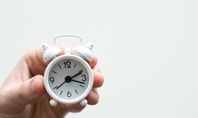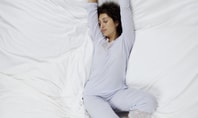Falling asleep quickly: The 10 best tips for getting to sleep
Have you ever heard of it? We’ve all been there: you go to bed at night, tired and drained from the day, but something is still stopping you from falling asleep. Whether you’re thinking about all the things you have to do the next day or your phone is keeping you awake again, we’ve got the best tips for a healthy evening routine to help you fall asleep quickly.
by CALIDA
September 4, 2024•5 min reading time

Smiling man in striped CALIDA pyjamas, sitting relaxed with eyes closed and hand on his face.
Table of Contents
Falling asleep tip 1: Fixed bed times
Falling asleep tip 2: Exercise during the day
Falling asleep tip 3: Brain dumping
Falling asleep tip 4: Meditation & breathing exercises
Falling asleep tip 5: Warm shower or bath
Falling asleep tip 6: Read instead of scrolling
Falling asleep tip 7: Darkness & quiet
Falling asleep tip 8: Bed linen & pyjamas made from natural materials
Falling asleep tip 9: Weight blankets
Falling asleep tip 10: Soothing teas & dietary supplements
Falling asleep tip 1: Fixed bed times
To make it easier for your body and mind to fall asleep in the evening, a sleep-wake rhythm with set times can help. If work and daily life permit, you should align this with your personal biorhythm or chronotype.
While some people naturally wake up early, others go to bed later and need to sleep longer in order to feel well-rested. It’s best to use your time on holiday to figure out when you naturally start to feel tired and how many hours of sleep you need. If possible, integrate these times into your daily routine or at least try to stick as close to them as you can.

Falling asleep tip 2: Exercise during the day
What you do throughout the day can also impact how easily you fall asleep. Especially for people who work in office jobs, it is important to compensate for long periods spent sitting by including some physical activity. Daily walks, short workout sessions or bike rides will ensure that both your mind and body are tired in the evening. This will help you to counteract restless legs and other typical symptoms of moving too little.
But watch out: But remember: be careful not to do any strenuous workouts immediately before going to bed – it’s better to do a quiet yoga session instead. Otherwise, your increased heart rate could make it even harder for you to fall asleep.
In addition to movement and exercise, taking an afternoon nap can also affect your sleep at night. People who nap for too long or too late in the day often aren’t tired enough in the evening. So if you’re struggling to fall asleep, you should only take a 10- to 30-minute power nap at most – and ideally around lunchtime, not in the afternoon!
Falling asleep tip 3: Brain dumping
If you can’t wind down in the evening because your head is full of things you need to check off your to-do list, worries or thoughts, then brain dumping can help you get these thoughts out of your head. There are several ways for you to do this, and you can even combine them.
For example, you can consciously focus on thinking about something else, something beautiful. A gratitude journal can help you become mindful of these positive thoughts and to be grateful for what is going well in your life at present.
You can also make a note of neutral thoughts or write down on a piece of paper what is bothering you, what you have to do the next day, etc. Writing down unfiltered thoughts helps you to get rid of them, gather your thoughts, see things from a different perspective and have a clear head when you go to sleep.
Falling asleep tip 4: Meditation & breathing exercises
Another way to become mindful is to practise meditation. Unlike when writing down feelings and thoughts, the aim here is to let the thoughts move on as quickly as possible and not dwell on them for long. Guided meditations, progressive muscle relaxation or breathing exercises such as the 4-7-8 technique are particularly suitable for beginners, as they set a specific rhythm.
The 4-7-8 technique is a particularly simple and effective method for lowering your pulse and heart rate. You can also do it in the dark while you’re already lying in bed. Simply breathe in through your nose for four seconds, hold your breath for seven seconds and breathe out through your mouth for eight seconds. Repeat this technique until you feel a sense of calm wash over you.
Falling asleep tip 5: Warm shower or bath
Having a warm bath or shower is another popular way of helping people get to sleep; it relaxes your muscles and really allows you to wind down at the end of the day. You can also use calming bath products, dim the lights in the bathroom or light candles to help get your mind ready for bed.
You should avoid having contrast showers or cold showers after a bath if you want to be able to fall asleep easily. This ritual is better suited for a morning shower to get your circulation going and really wake you up.
Falling asleep tip 6: Read instead of scrolling
Many people keep their mobile phones on their bedside table or in bed, often right next to their head. As long as it’s just lying there, there’s nothing really wrong with this – after all, many people use their smartphone as an alarm clock.
Nevertheless, it’s tempting to check your phone again in bed – and before you know it, you’ve been lured into the social media and email trap: an endless rabbit hole of funny or questionable videos, old photos that bring back memories, and work emails that trigger stress and remind you of the next day. But all of this could be avoided.
If you banish your smartphone from your bedroom or at least leave it switched off, you don’t risk any distractions that could wake you up – especially since the blue light from screens suppresses or slows down your body’s production of the sleep hormone melatonin. Instead, it’s advisable to switch to a standalone alarm clock and read a book in the evening that doesn’t get you too worked up.
Falling asleep tip 7: Darkness & quiet
We’ve already mentioned it: The sleep hormone melatonin. This is produced in the dark, which is why you should darken your bedroom as much as possible to help you fall asleep quickly – it’s actually best to spend the last hour or two before going to bed in a setting with natural or dimmed light.
You should also make sure your bedroom is as quiet as possible. If you live on a busy street, close the windows or use earplugs to ensure both peace and quiet and fresh air in your bedroom.
If complete silence bothers you and gets your mind racing, you can also try listening to rain sounds or soothing music. White noise is also an option; this is a monotonous, rushing sound that lies in a frequency range that is even said to have a calming effect on babies.
Even though many people rave about podcasts, videos and other entertainment formats for falling asleep, these are best left as a very last option, since there’s a risk that the topic will end up enthralling you and keeping you awake for longer than necessary.
Falling asleep tip 8: Bed linen & pyjamas made from natural materials
In addition to a quiet and dark sleeping environment, the right choice of bedding and pyjamas can also make it easier to fall asleep. Firstly, you should make sure that your sleeping environment is equipped for the season – with the temperature of your bedroom, but also with your bed linen and sleepwear.
Ideally, your bedroom temperature should always be between 15°C and 19°C. If you tend to feel the cold in winter, a thick down duvet and cosy, warm pyjamas are what you want. In summer, however, you should opt for thinner bedding and sleepwear that absorbs moisture and perhaps even has a cooling effect. Natural materials are the ideal choice in both summer and winter, as they are breathable and regulate temperature better than synthetic materials.
Falling asleep tip 9: Weight blankets
If you are plagued by anxiety or spiralling thoughts and often long for a loving goodnight kiss and a tight hug in the evening, a weighted blanket could be just the right alternative for you.
Said to help with falling asleep, weighted blankets were originally used in autism therapy. Thanks to its weight, the blanket is said to have a calming effect by exerting an even depth pressure on the entire body. Many adults swear by the soothing effects of these heavy blankets, which weigh up to 12 kilos and provide a feeling of security.
Falling asleep tip 10: Soothing teas & dietary supplements
You should always be careful with nutritional supplements and, if necessary, consult an expert to discuss their use. However, if you are not pregnant or breastfeeding and you have no other intolerances or contraindications, there are also natural herbs and plants you can take that have a calming effect and can make it easier to fall asleep.
First and foremost, it says valerian: This soothing medicinal herb is available as a tea, but also in the form of capsules and tablets. Passionflower, hops and lemon balm are also known for their calming properties.
Anyone considering taking melatonin, 5-HTP or tryptophan should first establish whether they actually have a deficiency. Even though these are naturally occurring hormones or amino acids, using them incorrectly can lead to no results and can even have side effects.
We generally recommend seeking medical advice if you experience persistent sleep disturbance. Whether you have trouble falling asleep, find yourself constantly waking up or have other sleep problems, your GP is the first person you should consult. They can order a blood test to identify if you have any deficiencies, and refer you to a sleep laboratory or other experts. With comprehensive diagnostics and treatment, you will be able to fall asleep quickly, and keep doing so in future.
Discover more interesting blog posts:


